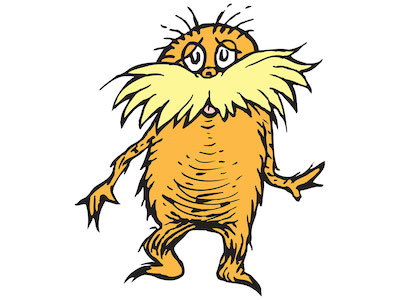The Media Research Center loves to attack media outlets that put the blame on President Trump’s anti-immigrant rhetoric for the El Paso massacre, in which the white supremacist suspect has expressed anti-immigrant sentiments and said he was targeting Hispanics. But the MRC weirdly has no problem going farther afield to assign blame — namely, Dr. Seuss.
Corinne Weaver ranted in an Aug. 6 MRC post:
You can’t buy a Confederate flag on Amazon, but you can read literature that helped inspire one of the deadliest shootings in the United States.
The Lorax, a children’s book by Dr. Seuss, was a recommended title in the El Paso shooter’s alleged manifesto. In fact, it was the only title referenced in the entire four-page document. And while an Amazon user can’t buy guns or Confederate flags, the book is readily available.
That probably sounds ludicrous, banning a book because it was cited by a terrorist. But that’s the media mindset. Only they aren’t pressing Amazon over The Lorax.
USA Today wrote that “white supremacist ideologies” and “white power manifestos” are one click away on Amazon and Amazon products. The article never even referenced the only title mentioned in the manifesto.
[…]Nothing is sacred. But if the media and tech platforms are so interested in taking down the inspirations for mass shootings and crimes, then why aren’t Jodie Foster films like Taxi Driver banned?
In a written statement to the MRC, Amazon stated, “We’re committed to providing a positive customer experience and have policies that outline what products may be sold in our stores. We invest significant time and resources to ensure our content guidelines are followed, and remove products that do not adhere to our guidelines– which can be found here for books. We are always listening to customer feedback and evaluating our policy.”
8chan was taken down because it was called “lawless.” The platform where the shooter published his manifesto was punished on August 5 when two network providers refused to host the site any further.
Yes, Weaver is really agitating for Amazon — and, presumably, bookstores and libraries all over America — to censor and ban “The Lorax.” And she actually contacted Amazon for comment. (Weaver, by the way, doesn’t understand that Google is not a retailer.)
Oddly, Weaver seems much more conciliatory toward 8chan, putting “lawless” in scare quotes and lamenting that it was “punished” for being chock full o’ racists like the El Paso shooter. (Weaver also thinks that Gab, another haven for white supremacists, is merely about “free speech.”)
The MRC is weirdly committed to this talking point, by the way. Joseph Vazquez huffed in a post the same day:
Following the murder of 20 people by a racist terrorist in El Paso, Texas, the liberal media cherry-picked portions of his alleged manifesto to connect him to the right. But some ignored portions that cited The Lorax as an inspiration for his views — a book and movie the liberal media used to love to promote because of its environmental agenda.
[…]It cited the Dr. Seuss’ fable writing, “This phenomenon is brilliantly portrayed in the decades-old classic ‘The Lorax.’ Watersheds around the country, especially in agricultural areas, are being depleted. Fresh water is being polluted from farming and oil-drilling operations.” He attacked “consumer culture” for plastic and e-waste, complained about urban sprawl, the use of paper towels and the unwillingness of people to change their lifestyles.”
Many of those environmental attitudes are promoted by the liberal media. In 2012, it fawned over the updated Lorax movie adaptation was released. NBC’s Today, CBS New York, Huffington Post and others celebrated its environmental messaging.
Strangely (or maybe not so strangely), neither Weaver nor Vazquez cited any particular passage in “The Lorax” that could possibly be interpreted as encouraging a white supremacist to murder Hispanics. Perhaps because, you know, there isn’t any and the MRC is just trying to spin away Trump’s much closer connection to the attitudes in the shooter’s manifesto.
